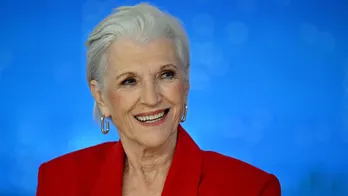After years in conflict zones, a war reporter reckons with a deadly cancer diagnosis
As a war correspondent for The New York Times, Newsweek and the Philadelphia Inquirer, Rod Nordland faced death many times over. He's felt bullets whizzing by his head in Cambodia, and once escaped a hotel room in Sarajevo moments before a mortar attack reduced his bed to rubble.
But in 2019, Nordland confronted a different type of danger when he was diagnosed with glioblastoma, the most lethal form of brain tumor.
The median life expectancy for someone with glioblastoma is about 14 months. Less than 7% of people survive five years. Nordland says his time as a war corresponded helped prepare him for his cancer diagnosis.
"One of the most important things I learned as a war correspondent was ... to stay calm and not lose control of your emotions," he says. "And I think that's been a really good lesson for dealing with cancer, too."
Optimistic by nature, Nordland acknowledges that he's already beaten the odds by living with glioblastoma for as long as he has. He's actively engaged in treatment, but he also recognizes that there is no cure for his type of cancer.
"I had to face the reality that my death was within a fairly short timespan, highly probable," he says. "That had never been the case before. And I think it made me a better person for that."
Nordland writes about facing mortality from war and cancer in his new memoir, Waiting for the Monsoon.
Interview highlights
On his current treatments for glioblastoma
I'm doing a low-dose of chemo, and I'm also wearing a device on my head called an Optune. It's a series of ceramic arrays that are kind of glued to my head after I shave it. And then they they emit electronic beams that are thought to fight tumors. ... So every three days or so I have to shave my head bald and then reapply the arrays. And I have to make sure that the Optune machine is close to me. So it often means having somebody else carry it for me if I move it around or put it in a backpack or in the back of my wheelchair. So that's a bit annoying and certainly restricts my movement a lot.
On the side effects of the treatments
I do use a wheelchair when I go out to appointments, to doctors appointments, just for safety's sake. Because while I can walk with a cane sometimes without a cane, I'm very prone to falls and tripping because ... when the doctor cut the tumor out, he also cut some nerves that provided sensation to my left side. So I have no sensation on my left, which causes a lot of mobility problems. It gives you what they call poor proprioception, which is a fancy word, meaning your brain's knowledge of where your body is in space. And if your brain doesn't know where your body parts are, you're obviously very prone to falls, which, in my case, are bad for my head [and] can be fatal.
On being a war correspondent
When I began working as a war correspondent, I was still 20-something and still in many ways an adolescent. Like a lot of young people, I really didn't believe in my own mortality. And I think that's true of a lot of people who do that kind of work, because otherwise, who would do it? Who would jump out of an airplane into a parachute if they didn't have some belief in their own immortality? So I lost that arrogance very profoundly when I was on a front line against my own rules in Cambodia, on the outskirts of a refugee camp where there was a nasty little internecine war going on between factions that ran the camp and lived off of the proceeds of the food and supplies they could steal. ... I was standing shoulder to shoulder with one of these militiamen, and there were bullets whizzing over our heads. ... And we just stood there like idiots. And one of those bullets hit the guy next to me and blew his brains out, quite literally.
... After that, I started doing it really differently. That taught me that I was, in fact, mortal, which is an important lesson that all young men should learn as soon as possible. And after that, I never went to the front lines anymore.
On the meaning of life
I asked everybody I met what the meaning of life was. I even asked Alexa. The answer was, to quote Eleanor Roosevelt, that "the purpose of life is to live life to the fullest and to enjoy everything about it." That's somewhat of a lame answer. But at one time I asked that question of a nurse and she turned it around on me and said, "What do you think the meaning of life is?" So I said, "Well, I'm sorry, I'm going to have to punt on that. But I think the meaning of life is, as Raymond Carver said, 'to feel yourself beloved on this earth.'" And that was my answer then. And it's my answer in the book too.
Sam Briger and Susan Nyakundi produced and edited this interview for broadcast. Bridget Bentz, Seth Kelley and Carmel Wroth adapted it for the web.
Disclaimer: The copyright of this article belongs to the original author. Reposting this article is solely for the purpose of information dissemination and does not constitute any investment advice. If there is any infringement, please contact us immediately. We will make corrections or deletions as necessary. Thank you.







